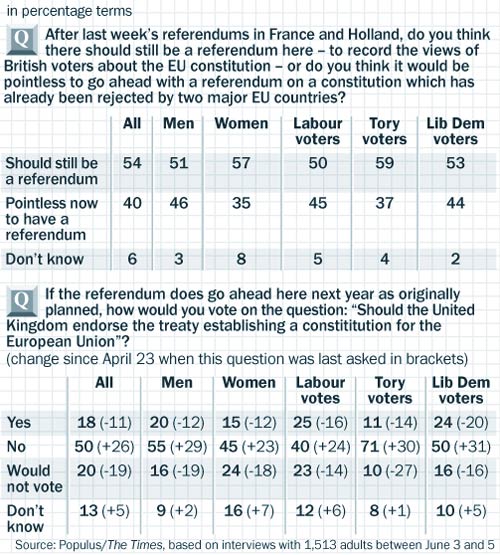Europe remains a headache for the Government. Any thought that the French and Dutch votes on the EU constitution have eased Tony Blair’s problems is very short-sighted, as was clear from Jack Straw’s deft balancing act yesterday in the Commons.
Burying the constitution will not be easy, or quick. The last rites can only be performed by all 25 countries acting together. Calls for ratification to continue as if nothing had happened are fatuous and self-defeating.
Just look at the latest Populus poll for
The Times, taken over the weekend after the French and Dutch votes. Some 54 per cent of the public say there should still be a referendum to record their views, though I would bet that far fewer would vote if there was one. And, surprise, surprise, the number saying they would vote “no” has doubled to 50 per cent since the question was last asked six weeks ago. Just 18 per cent would now vote “yes”.
No government would ever go ahead with a referendum on that basis. Mr Straw did the minimum necessary by announcing that the ratification Bill will be put on ice. If he attempted a second reading, as other countries want, he would be laughed out of the Commons. Critics of Britain have to explain whether, how and when the French and Dutch decisions can be reversed.
But it is not just a matter of killing off the treaty, tricky though that will be. The changes, notably enlargement to 25, that led to the constitution still have to be addressed. The EU will not collapse, only become less effective. Denunciations of introducing the constitution by the backdoor are infantile. All but the most obsessive europhobes accept that there are some good bits in the treaty. It would anyway be impossible to push through the most controversial parts, even if the Government wanted to do so, which it does not.
As Mr Straw argued, it would be daft to oppose, or to insist upon a referendum, on proposals to give national parliaments a greater say in the formulation of EU policy: the “yellow card” procedures under which draft directives can be sent back for reconsideration.
Similarly, there is a strong case for moving from the current six-monthly rotating presidency to a full-time (two and a half year) presidency of the European Council.
The British presidency will also have to deal with enlargement, which Mr Straw said would go ahead, and with the EU’s budget and the British rebate, very explosive in its own right. Above all, Britain will try to maintain the momentum on economic reform. That will be very hard in face of French demonisation of “Anglo-Saxon” liberalisation and probable pre-election inertia in Germany.
Writing off Europe, as some gleeful Tories and even a few silly Labour advisers want to do, is asinine. Mr Blair’s dreams of resolving decades of awkward relations with the EU may be in tatters. But, as Sir Menzies Campbell of the Lib Dems and Mr Straw agreed, Britain remains stronger when it works with its EU partners. Mr Blair has to work out a new strategy, covering much more than the defunct constitution.
